- Home
- Bruce Sterling
The Artificial Kid Page 4
The Artificial Kid Read online
Page 4
We all had sherbet, then had servants clear away the breakfast table and bring in lounge chairs. Manies passed around some mild after-breakfast drugs, and Spinney read us part of the new installment in his Telset Cycle. The eastern sky slowly reddened with dawn, and when the sun’s vivid yellow rim touched the horizon we greeted it with shouts of acclaim. The placid waters of the great Gulf of Memory flamed up gold for an instant, then settled into the deep sapphire blue of daylight.
Breakfast was over; it was time to go home.
3
I now had one week to prepare for the Harlequinade, really an absolute minimum for a person in my status position. Most of the time I enjoyed status maneuvering—what Reverid doesn’t?—but there were times when the endless minutiae and petty bickering made me sick, and this was one of them. I felt that it was aging me before my time.
The young can’t begin to compete with the old in dominance games; the old have an overwhelming advantage in self-control, in experience, in knowledge of human motivation. But thanks to combat art and the Decriminalized Zone, the young now have their own social arena and their own rules of politesse. In fact, in many ways the combat art system has become a microcosm of the larger world outside. But it’s our microcosm, where a young person at least has a chance at power—in the outside world you can only look forward to a hundred years of kindly, gentle, subtle slavery.
In this smaller world, I was a man to reckon with. Naturally I had my own client coterie, the Artificial Youth Faction. I restricted the membership to twelve, and the competition was intense, especially since I made it a point of honor never to beat up my clients unless they really deserved it.
The arrangements for the Harlequinade took time. First there was the problem of my costume. I made very little attempt to disguise myself, since the plasticized hair of myself and my twelve minions made disguise useless. Instead, I wore my usual fighting gear, barely camouflaged under a loose black-and-white smock and thin black flared pants vertically striped in scarlet. I also wore a simple black domino mask. Naturally I designed my own clothing.
Then there was the pressing matter of my palanquin. There was nothing wrong with the palanquin itself; Quade and I could easily unfold it, reassemble it, and redecorate it. The problem was choosing which six of my twelve clients would have the honor of bearing me about. The honored six would swagger intolerably, while the snubbed six would sulk. I had to arrange for everyone’s rendezvous, and then go through the grapevine to establish a suitable location for my palanquin during the hologram display. I couldn’t have cared less about the display, but socially speaking it was crucial that my palanquin be prominently placed.
I hated harlequinades.
Luckily, my good friend and fellow artist Chill Factor, cohead of the Cognitive Dissonants and chairman of C.D. Enterprises, was handling the details of the palanquin business. I got a call from him the day before the Harlequinade.
“Greetings, Arti, my little angel of violence!” said Chill. “How’s the leg?”
“Cast comes off tomorrow,” I told him. “What’s on your mind, Chill?”
Chill looked harried; his sharp, narrow, glacially blue face had little puckers between his white, frost-brittle brows. There was a freezing beaded condensate on his cheeks and forehead and his icicle hair was half-an-inch thick in white rime. His status position was keeping him busy.
Behind him on the wall of his tape room was a map of the area in question, neatly marked off in a hexagonal grillwork. “I have you here,” he said, rising from his console chair and pointing to the map. “You’ll be next to Raphael of the Fourways and Todd Regewgaws of the Manglers. I’m just up the hillside a way, with Icy and a few of the Cogs—Twinkles, Hammer, Happy Daze—you know, the usual lot.”
“I’ll be there,” I said. I was pleased at my position.
Chill looked relieved. He wiped his brow with the back of one ice-blue hand, cracking a thin layer of ice that had formed around his knuckles. Chill’s refrigerated second skin was form fitted perfectly to his face, but there were a few small telltale bumps and wrinkles around his fingers. I still don’t know how he supplied the necessary refrigerant power, but I suspect that it came from small engines hidden in his furry mukluks.
“You accept it, then?” he said. “Ah, that’s my angel Arti. The status war this year has stricken me with grief, endless grief. Several areas are contested, including your own. I expect—well, not bloodshed, because fighting on holidays is gauche. But this will be the cause of many a bruise feud in the new year.”
“I can hold my own territory,” I said. “Call on me if you need help.”
“Thoughtful, thoughtful,” nodded Chill. “The Billy Club are the only ones on the Civic Detail, by the way.”
I was disgusted. I despised police detail. The pay was great, but it was essentially a bribe from the Board of Directors to keep the combat gangs under control. Somehow the cunning old rascals had made the “Civic Detail” into a hotly contested honor. “Those bootlickers,” I said. “What good are they? They couldn’t punch their way out of a wet barrel. Crap, this could be serious.”
“There was something else I meant to tell you,” said Chill. He struck his forehead with the icy palm of his hand, then tore it loose with a shredding sound. “Ah yes. The mysterious gentleman in Red.” He raised his voice. “Icy! Did I file that call under ‘Grudges,’ or under ‘Threats’?”
“I think under grudges, darling,” came Ice Lady’s voice from off camera.
“Oh dear. I think the grudge file overflowed its capacity yesterday—you know these combat poseurs, Arti, taking a status demotion so, so personally—I must have lost the call. The man in question offered me five hundred fracs to beat you senseless.”
“Was it anyone you knew?”
“He wore a red mask. He seemed old, though. Hard to tell, of course. Obviously he knew very little about the art, or he would have called one of your enemies, rather than me. In fact, I’m sure he has asked someone else already. He seemed quite determined.”
“Five hundred fracs isn’t bad pay.”
“For you, my angel Arti, I would have demanded at least five thousand.”
“You flatter me, Chill.” I cut off.
On New Year’s Day, the Artificial Youth Faction gathered together, to bear me in state through the Zone. The Decriminalized Zone was usually a lonely place. Most of the battered buildings were deserted.
Now, however, the Zone was clotted with people. As it always did, the sight of such a large crowd gave me a creepy sensation of awe. For the first twenty years of my life, I had been alone on the reef except for Professor Crossbow and my tapes, and the occasional rare visitor. Even after eight years in Telset, crowds disturbed me.
There were all the expected costumes of Harlequinade, with a decided historical bent this time: floater costumes, the somber garb of the Mining Engineers, the black and nebular yellow of Confederate officials, the decadent six-hundred-year-old finery of the Niwlindid Directorate, combined, mutated, exaggerated, adulterated with every atom of a playful and cynical Reverid ingenuity. There were others dressed as historical figures—members of the Board of Directors, favorite artists, composers, and scientists, or drowned swimmers from Aquaria, Reverie’s ill-fated underwater city, or maddened plutocrats from the first rash days of expansionism; and then, crowding thick as swarming flies, the advocates of pure bizarrerie: people in fish costumes, dressed as insects, as birds, as crustaceans and coelenterates, people swathed in fur, or plated in skin-tight mirrors, people with no faces, or four arms, or eight legs; people in chains, in webs, in masses of bubbling froth; people dressed as the dead, the living, the not-yet-to-be, and the never-could-be. There were cameras everywhere.
It took a very special occasion to physically assemble Telset’s scattered population, but this was it. The entire population was there: over three hundred thousand people. A crowd that large assumes an uncanny life of its own. Multicolored streams and filaments of people were pouring in
and out of the crowd like the protoplasmic flow of an amoeba. Colored litters and palanquins were moving sluggishly above the heads of the crowd like food vacuoles. I rolled back the top of my palanquin and stood up as we neared the thickening edges of the crowd.
Cameras were drifting over the mass like hot droplets of grease over something frying. The crowd was making frying sounds; they were thousands of conversations, murmured propositions, shrieks of laughter, merging into an anonymous hiss and sputter like the sound from a blank tape, turned up far too high. Masked faces turned toward me; a murmur spread, because I had been recognized at once. Some people retreated from me, others advanced. I had a good view as the Artificial Youth Faction surged into the crowd.
I had delayed my arrival until midafternoon. The real fun would probably not begin until nightfall, anyway.
“You, sir! The gentleman in the black domino!” I looked down. I had been hailed by Emery Board, one of the minor members of the Billy Club. I recognized her despite her fish mask; she was wearing the rainbow armband of the Civic Detail. “This stranger has begged for an introduction.” A huge lout in tasteless fringed leather clothing was standing at Emery’s elbow. The stranger wore no mask. He was obviously not from Telset.
“You call yourself the Artificial Kid?” he bellowed, in a stupid breach of etiquette. He should have shown at least a token confusion over my disguise. I turned two cameras on him. “Why deny it?” I said easily.
“Why don’t you hop out of that contraption and talk to me man to man?” he demanded. “It makes my neck hurt to look up.” Shocked titters arose from a rapidly growing group of spectators.
“My pleasure,” I said. I leapt out of the palanquin and knocked him down with a kick in the chest.
He rolled with the kick and got up easily enough, dusting off his peculiar backwoods clothing with his rough, calloused hands.
“You’re pretty clever with your feet,” he said levelly. “In Jucklet we don’t think much of feet fighters.”
“In Jucklet you don’t think much at all,” I observed, winning a gratifying round of applause from the masked spectators. My cameras went into combat position. The six members of the Artificial Youth Faction set down the palanquin with sighs of relief and sat on it, grinning under their masks.
“I’ve seen you fight before, but I don’t call that real fighting,” the man said. “You don’t feel pain. You use those chuka sticks. It’s not man to man. It’s opera stuff. It’s faked! I’m more of a man than you, and I can prove it!”
The crowd was eating it up. Ribald suggestions flowed from their decadent lips. “Show us your manhood, then!” “Kiss ’im, Kid!” “Go on, Leather! Challenge him!”
I raised one hand for silence. From the corner of my eye I noticed that cameras were accumulating everywhere, which annoyed me; I hate bootleg tapes. “What do you propose?” I asked.
“Punch for punch,” he said. “Man to man. No weapons. No dodging or defending. Last man to get back up loses. That’s what I call an honest bout.”
He knew as well as I did that those were impossible terms; it was my skill at dodging, defending, and blocking blows that made up for my lack of height and bulk. “Fine,” I said. “You strike first.” I dropped my candy-striped nunchuck and put my hands behind me.
As I expected, he swung for my chin. As the punch came in I leaned forward slightly and dropped my jaw. He punched me in the teeth. For anyone but myself it would have been a fatal gambit, but my teeth are a sturdy legacy from dear Old Dad. They were all false, tooth-shaped white ceramic over a crystalline metal core, anchored solidly to one of the thin ceramic plates that armored my skull. He screamed and drew away his hand, dripping blood. I smiled evilly, skipped forward and hit him in the neck with the outside edge of the base of my hand. He fell down choking and soon lost consciousness. It was a nasty blow, but he was a nasty man.
I spoke quietly to Emery. “Get him to a doctor, Emery. You’d better hurry. I’ll assume the charges.” The man’s neck already showed a dark stain; it was probably arterial hemorrhage.
I picked up my nunchuck and jumped back into the palanquin to a round of polite and somewhat intimidated applause from the spectators. If they had expected a long slugfest they were disappointed, but I wouldn’t waste time being pounded for the sake of someone else’s cameras. I pulled the cover of the palanquin up for privacy as the Artificial Youth Faction hoisted it with a grunt to their shoulders. I put salve on my lips to stop the swelling. My bravado in letting him strike first had cost me, but you don’t win a reputation without taking risks.
Following the instructions that Chill had given me earlier, the Youth Faction made their way toward the area I had staked out for the hologram display. A nameless poseur had had the gall to park his palanquin in my place, and I had the Youth Faction dump him and stomp him soundly. We watched him crawl off as we broke his palanquin to pieces.
“Trouble, trouble, trouble, always trouble,” observed a wry, vibrant voice. It was my best friend, the well-known combat artist, Armitrage. Armitrage had a lovely dark young woman on his left arm and a gentle, rather frightened-looking young man on his right. “These, sir, are my two new clients,” he said, noticing my gaze. “For the time being you may address them as Jonquil and Coral.” He struck a pose. “Have no fear, darling clients. I will protect you from this sinister ruffian.” His two clients giggled shyly, cupping their hands over their mouths. I never learned which name fit which client.
Armitrage and I were so close that we merely played with the formalities of disguise. “Delighted to see both you and your complaisant lovelies, dear Stranger doll,” I said. I invited him into my palanquin and offered him a flavored ice-stick. My housekeeper Quade, who had been faithfully tagging after me all this time, rushed up to offer sweetmeats to his two lovers.
“Where’s your litter, ’Trage?” I asked.
He shrugged. “Left it behind,” he said. “My aching death, these harlequinades bore the morals out of me.” He sucked meditatively on his ice-stick. “It’s as hot as the Morning Star out here. I can’t remember when I’ve seen such a crowd, even on tape.” I nodded. “I saw Money Manies a while ago,” Armitrage said. “He had his Alien with him.”
“Not again,” I said.
“He never learns,” Armitrage said sadly. “Even if he does learn, then he forgets.”
“Yeah,” I said. Even for an old man, Money Manies was unusually prone to peculiar lapses of memory. Most people thought that Manies was really forgetful, but I was convinced that it was one of his affectations. He was entirely too alert to be genuinely absent-minded.
“I understand the Clone Brothers are looking for you,” Armitrage said. “I thought you’d settled with them.”
“So did I,” I said. “However, if they haven’t learned, I’m always ready to administer another lesson.”
“Want me to tag along today, in case there’s trouble?”
“My gratitude, but no.”
Armitrage shrugged again. “That’s my proud Arti.” He leaned gracefully back into the palanquin.
Most of the palanquins in the viewing area were down, and their tenants had left them to stroll about and socialize. The area just around us was crowded with combat artists and their young hangers-on. I spotted members of the Fourways, the Manglers, and the Perfect Stranglers.
Armitrage pried an artificial bubo from his neck and scratched under it. (I haven’t mentioned as yet that Armitrage was disguised as an early Reverid settler suffering from a lymph infection.) “What are your plans now?” he asked. I shrugged. “Join me, then,” he offered. “I’ll keep you amused. You feel like some hot flashes? I’ve got some really nice Red Dust on me.” Armitrage, besides being my best friend, also sold me my smuff. He was the drug supplier for many of the artists of the Zone—a very high-status occupation. “Maybe,” I said. “I’d prefer something milder, though.”
“Let’s see what we can barter for, then.” We dismissed our attendants and plunged into the crowd
.
A man walked by us on stilts; Armitrage unobtrusively tripped him and sent him sprawling into a picnicking group of dancers from the third contingent of the Telset Ballet. Snickering, we ducked away behind the bearers of a litter. We detoured around a huge two-man pink palanquin belonging to a pair of lovers from the Perfect Stranglers, then almost stumbled over one of the Clone Brothers.
The Clone in question was squatting on the broken, weed-grown pavement with Jet Pink of the Stranglers, tossing polyhedral dice. He turned, saw me, and scrambled quickly to his feet. He was wearing a bright red bodysuit dotted with small metal studs. His mask was a stiff elongated band of white plastic that encircled his head; narrow red lenses hid his eyes. The plainness of this costume was strange for the tawdry Clones. It looked like livery, and its color could mean only one thing.
“Well,” piped the Clone, recovering his composure. “It’s the Mechanical Boy. How delightful to see you, Mechanical.”
I looked him over, with contempt. “You shouldn’t wear red, Clone doll,” I told him. “It doesn’t suit you.”
“It hides the splatters of blood from those who offend their betters,” said the Clone confidently. He stepped closer. I smelled the faint bitterness of cosmetic spices on his breath. He reached out slowly and laid his long, narrow palm across my cheek. “On behalf of my brothers and other selves, we challenge you, Artificial Kid. We challenge you! Bruise feud!” He slapped me.
I stepped back. “Tell your boss, the coward in red that hired you, that I will demolish him after I finish with his bootlicks.”
The Clone pursed his lips. “Bootlick? Harsh words from the fawning pet of Money Manies.”

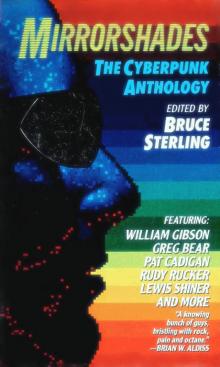 Mirrorshades: The Cyberpunk Anthology
Mirrorshades: The Cyberpunk Anthology The Wonderful Power of Storytelling
The Wonderful Power of Storytelling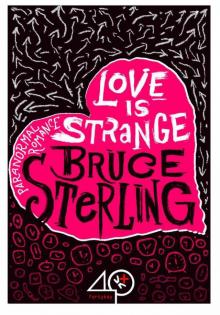 Love Is Strange (A Paranormal Romance)
Love Is Strange (A Paranormal Romance)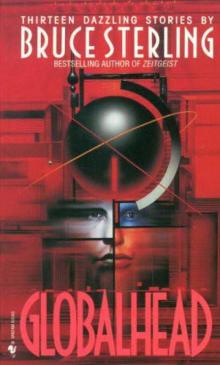 Globalhead
Globalhead Essays. FSF Columns
Essays. FSF Columns The Hacker Crackdown
The Hacker Crackdown Bicycle Repairman
Bicycle Repairman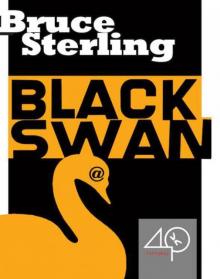 Black Swan
Black Swan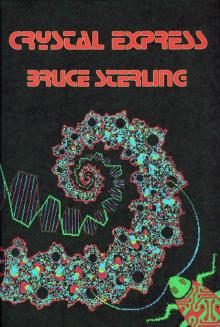 Crystal Express
Crystal Express Islands in the Net
Islands in the Net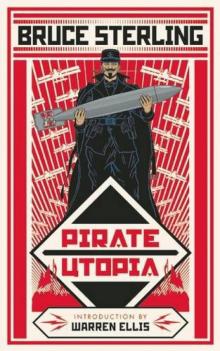 Pirate Utopia
Pirate Utopia GURPS' LABOUR LOST
GURPS' LABOUR LOST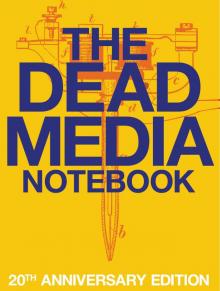 The Dead Media Notebook
The Dead Media Notebook Unstable Networks
Unstable Networks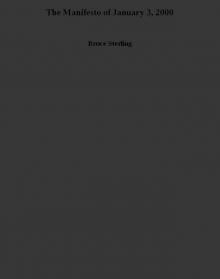 The Manifesto of January 3, 2000
The Manifesto of January 3, 2000 Heavy Weather
Heavy Weather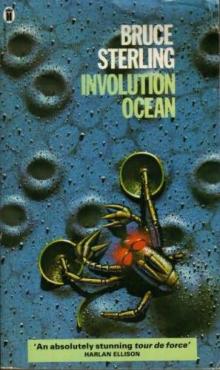 Involution Ocean
Involution Ocean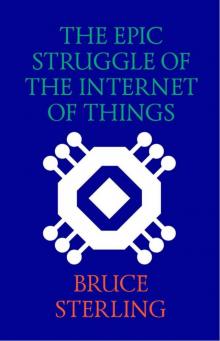 The Epic Struggle of the Internet of Things
The Epic Struggle of the Internet of Things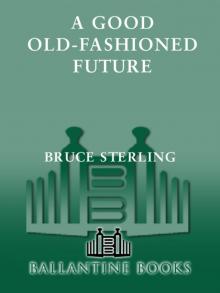 A Good Old-Fashioned Future
A Good Old-Fashioned Future The Littlest Jackal
The Littlest Jackal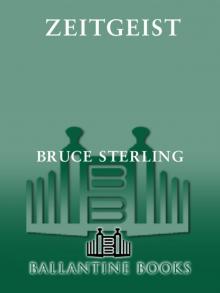 Zeitgeist
Zeitgeist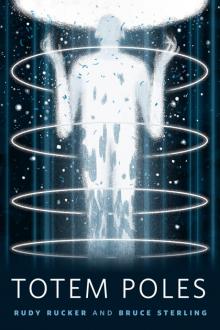 Totem Poles
Totem Poles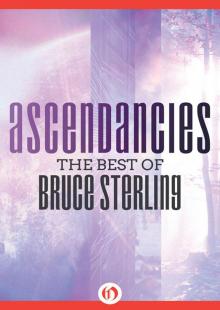 Ascendancies
Ascendancies CyberView 1991
CyberView 1991 War Is Virtual Hell
War Is Virtual Hell Taklamakan
Taklamakan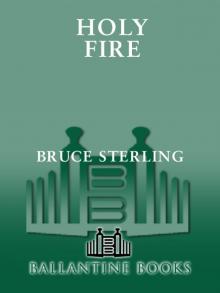 Holy Fire
Holy Fire Cyberpunk in the Nineties
Cyberpunk in the Nineties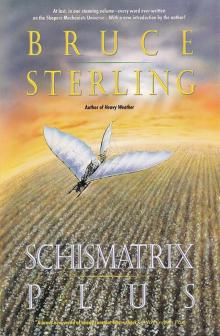 Schismatrix Plus
Schismatrix Plus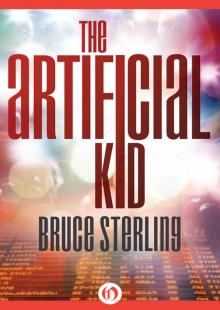 The Artificial Kid
The Artificial Kid Essays. Catscan Columns
Essays. Catscan Columns Maneki Neko
Maneki Neko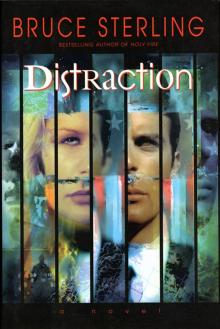 Distraction
Distraction In Paradise
In Paradise Red Star, Winter Orbit
Red Star, Winter Orbit Luciferase
Luciferase